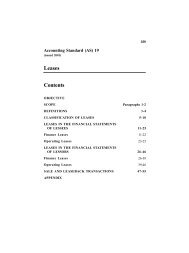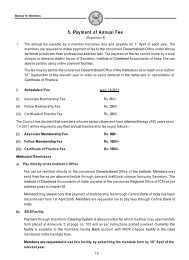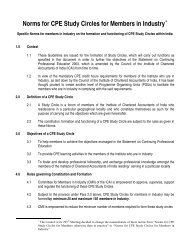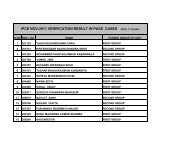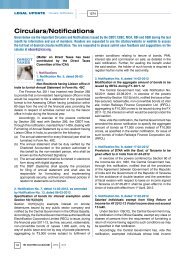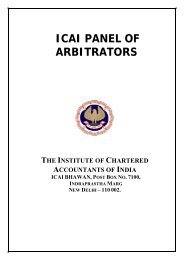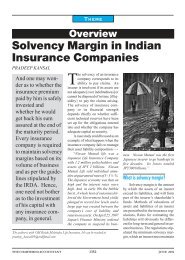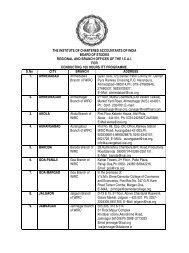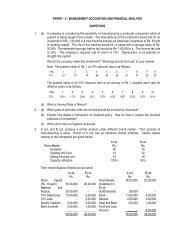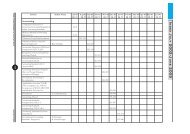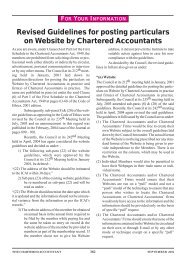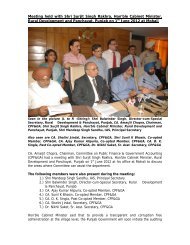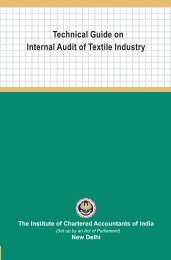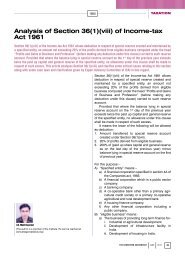The Chartered Accountant
The Chartered Accountant
The Chartered Accountant
Create successful ePaper yourself
Turn your PDF publications into a flip-book with our unique Google optimized e-Paper software.
LEGAL UPDATE<br />
can be said to be legal, valid or in consonance with<br />
law. Firstly, the order passed by the High Court is a<br />
blanket one as held by the Constitutional Bench of<br />
this Court in Gurbaksh Singh Sibbia & Ors. v. State<br />
of Punjab, (1980) 2 SCC 565, and seeks to grant protection<br />
to respondents in respect of any non-bailable<br />
offence. Secondly, it illegally obstructs, interferes and<br />
curtails the authority of Custom Officers from exer-<br />
cising statutory power of arrest a person said to have<br />
committed a non -bailable offence by imposing a condition<br />
of giving ten days prior notice, a condition not<br />
warranted by law. <strong>The</strong> order passed by the High Court<br />
to the extent of directions issued to the Custom Authorities<br />
was, therefore, liable to be set aside.<br />
<strong>The</strong> appeal was partly allowed.<br />
Section 2(f) of the Central Excise Act, 1944 — Manufacture<br />
Cutting and slitting of steel sheets and polyester films used for lamination purposes do not amount to manufacture<br />
Commissioner of Central Excise, Mumbai v. M/s Rajpurohit GMP India Ltd. & Ors. (Supreme Court) 14<br />
October, 2008<br />
Section 11A of the Central Excise Act, 1944 - Recovery of duties not-levied or not-paid or short-levied or<br />
short-paid or erroneously refunded<br />
Revenue was not justified in invoking the extended period of limitation<br />
Commissioner of Central Excise, Kanpur v. M/s. New Decent Footwear Industries (Supreme Court), 25 September,<br />
2008<br />
In this case, composite appeal filed by the Firm and<br />
the partners was partly accepted in the case of partners.<br />
Against the Firm the demand was confirmed.<br />
<strong>The</strong> Revenue did not file any appeal against the order<br />
passed in favour of “X”, the company to whom the<br />
Firm was supplying its proucts and the partners. <strong>The</strong><br />
Tribunal held that the Revenue was not right in invoking<br />
extended period of limitation under the proviso<br />
to Section 11A.<br />
Section 37B of the Central Excise Act, 1944 — Instructions to Central Excise Officers<br />
A circular which is contrary to the statutory provisions has really no existence in law<br />
Commissioner of Central Excise, Bolpur v. M/s Ratan Melting & Wire Industries (Supreme Court) 14 October, 2008<br />
<strong>The</strong> Supreme Court held that Circulars and instructions<br />
issued by the Board are no doubt binding in law on the<br />
authorities under the respective statutes, but when the<br />
Supreme Court or the High Court declares the law on the<br />
question arising for consideration, it would not be appro-<br />
<strong>The</strong> Supreme Court held that as the Revenue had accepted<br />
the decision in the case of X arising from the<br />
same order of the authority in original and there being<br />
no change on the facts, the appeal against the respondent<br />
firm could not be proceeded with. Further, the<br />
Revenue was not justified in invoking the extended<br />
period of limitation.<br />
<strong>The</strong> appeal was dismissed.<br />
priate for the Court to direct that the circular should be<br />
given effect to and not the view expressed in a decision<br />
of this Court or the High Court. A circular which is contrary<br />
to the statutory provisions has really no existence<br />
in law.<br />
Service Tax<br />
Sections 76 read with Sections 77 and 78 of the Finance Act, 1994 read with Section 35F of the Central Excise<br />
Act, 1944 — Penalty for failure to pay service tax<br />
For the purpose of arriving at a finding as to undue hardship, the case as a whole should have been considered<br />
by the appellate authority<br />
Devi Constructions, Erode v. Commissioner of Central Excise, Salem (MAD), 15 October, 2008<br />
<strong>The</strong> respondent/appellate authority had directed the<br />
petitioner to make the payment of pre-deposit within<br />
30 days for the purpose of enabling the respondent<br />
to hear the appeal. <strong>The</strong> petitioner has not raised any<br />
point about the financial hardship and even at the<br />
time of hearing the appeal, any such hardship had<br />
not been contended. Whether respondent was justi-<br />
fied in directing payment of entire service tax due for<br />
the purpose of admitting the appeal without by itself<br />
considering undue hardship?<br />
<strong>The</strong> High Court held that for the purpose of arriving<br />
at a finding as to undue hardship, the case as a whole<br />
should have been considered by the appellate authority.<br />
<strong>The</strong> Appellate Tribunal before passing any interim<br />
THE CHARTERED ACCOUNTANT 1001 DECEMBER 2008



